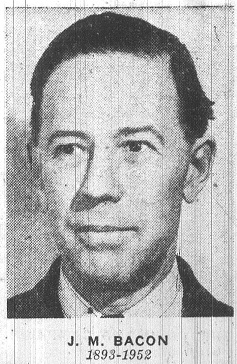J. M. Bacon Dies After Long Illness. J. Myron Bacon, World War I aviation ace, former alderman of Grand Forks, and prominent in a wide field of activities, died Sunday morning in a Grand Forks hospital following an illness of several months. He was 58 years old. Masonic funeral services have been set for 2 p.m. today in the Masonic Temple here with burial at Memorial Park cemetery. The body will lie in state at the Masonic Temple from 11 to 1:30 p.m. today. Pallbearers will be Frank C. Smith, C. C. Lillie, John C. Knauf, Harrison C. Barnes and A. N. Cooper of Grand Forks, and Charles Amundson of Bemidji, Minn. In addition to his wife, he is survived by one son, Cole D. Bacon of Minneapolis, who was with his father at his death; a brother, Keith V. Bacon of Grand Forks, and two grandchildren, Mark and Carol Bacon.
Trained Aviators. One of the few World War I aces who took an active part in World War II aviation, Bacon resigned his seat in the Grand Forks city council in 1942 to accept a training post for military fliers at Falcon Field, Ariz. Interested in athletics all his life, Mr. Bacon was University quarterback on the football teams of 1911, ’12, and ’13. Following that, he was connected with his father, the late J. D. Bacon, in the management of the Hotel Dacotah, Lilac Hedge Farm and an elevator business. Upon his return to Grand Forks following his World War I service in the Canadian Royal Air Force as a combat pilot and instructor, Bacon resumed his residence in Grand Forks and was prominent in business, athletic, and veteran activities.
Coached Teams. Five years in the mid-thirties, Bacon acted as coach of the Grand Forks American Junior Baseball team, and four of his clubs won state championships. From 1929 to 1934 he was manager of the Grand Forks Municipal airport and conducted a flying school and taxi service. Bacon was one of the outstanding bowlers and golf players of the city between his periods of military service. He was for some time a golf professional at Bemidji and Minot. His interest also included boxing and wrestling, and he refereed many bouts in Grand Forks, including some golden gloves tournaments.
Attended Central. Born in Grand Forks Dec. 28, 1893, Bacon was educated in the public schools, receiving his high school diploma with the Central High School class of 1911. He then entered the University. A member of the North Dakota National Guard at the entrance of the United States into World War I, Bacon was transferred to the first officers’ training at Fort Snelling, Minn., from the machine gun company of the First North Dakota Infantry. At Snelling he was a member of the Fifth Company, the only World War I officers’ training company which still maintains its organization. He later entered the Canadian Air Force and served with it until Dec. 21, 1918, when he was discharged in Dover, England. He had been a flying instructor and a combat pilot. In his eight months of war flying, he brought down six German planes and three balloons. Until his death he was an active member of the Methuselah Club, an exclusive aviation organization.
Gave Exhibitions. Like most World War I combat pilots, Bacon gave exhibitions and taught flying after his release from the service. He was one of the earliest pilots to demonstrate stunt flying in Grand Forks and at other North Dakota fairs. He gave up some of his active flying when he was married to Miss Billie Cole at Fort Worth, Texas, June 28, 1919, just thirty-three years and one day before his death. They made their home in Grand Forks until he resumed aviation at Falcon Field.
When Grand Forks abandoned the commission form of government and returned to the council form, Bacon became a candidate for alderman in the third ward. He was elected to the four-year term because he polled the highest vote of four candidates. He served in the council until 1942 when he resigned to instruct military aviators. In addition to the Methuselah Club, Bacon was a member of the Masonic bodies and Kem Temple of the Shrine and the Elks Lodge. Since returning from World War II, Bacon had made his home at Bemidji, where he was engaged in the building business. (Grand Forks Herald, Tuesday, July 1, 1952, Volume 71, Number 203, Page 1)
